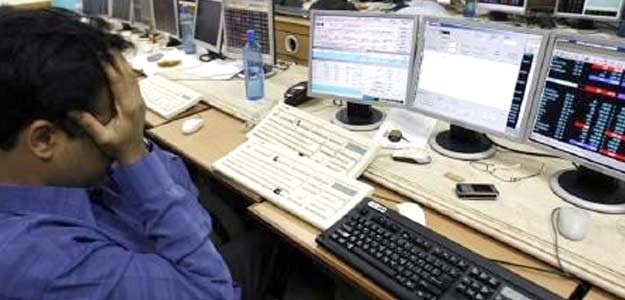Top five factors why Sensex fell over 850 points Economic Times
Post on: 16 Март, 2015 No Comment

MUMBAI: The S&P BSE Sensex reversed almost all the gains made post Christmas as it declined for the second consecutive session on Tuesday. The BSE Sensex nosedived by over 900 points in one of its worst falls and the NSE Nifty dipped below the 8,200-mark amid overnight losses in US markets, global slump in oil prices and Greek political crisis.
The 30-share index finally closed at 26,987.46, down 854.86 points or 3.07 per cent. It touched a high of 27698.93 and a low of 26,937.06 in trade today. The Nifty ended at 8127 down 251 points or 3 per cent. It touched a high of 8327.85 and a low of 8111.35 in trade today.
The benchmarks are nearing intermediate support zones and if buyers refrain from buying, then the market may weaken further in the next few sessions.
Analysts say domestic shares could be vulnerable to falls, with the NSE index having gained 31.4 percent in 2014, its best gain since 2009, although they say hopes about an economic recover and fiscal reforms could prevent excessive declines.
Blue-chips led losses as global shares sank on the back of a continued slide in oil prices that is raising concerns about the health of the global economy. ICICI Bank lost 4.2 per cent, State Bank of India fell 4.1 per cent while Infosys fell 2.1 per cent.
Oil explorers declined, tracking the fall in US crude oil prices. Reliance Industries fell 4.5 per cent, while Oil and Natural Gas Corp slumped 5.7 per cent.
Following are the factors that have hurt investor sentiment in trade:
Crude oil: The global crude oil prices are in a downward spiral and have fallen to April 2009 lows. The Nymex crude oil slipped below $50 a barrel on concerns of oversupply. This resulted in a sharp correction in global markets, including India.
Crude has created a lot of uncertainties in global markets, which are adversely impacting the Indian market sentiment. The recent foreign fund sell-off in equities and decline in the rupee’s value can be attributed to this constant fall in crude prices, said Tirthankar Patnaik, India strategist and head of research of Mizuho Bank, adding that hence, free-falling crude poses serious challenges for the markets.
The supply glut is also being attributed to lack of demand as most of the major global economies are facing a slowdown. A global economic slowdown may impact Indian exports to Europe and other countries.
Traders are worried that the US crude may hit $40 per barrel area if the weekly US oil inventory numbers show supply build-up. The global oil market is likely to be flooded in 2015 with Russia, Iraq, West Africa, Canada and the US ramping up supplies. At the same time, Saudi Arabia is offering its biggest discount in 14 years to Asia consumers.
According to Mixo Das, Asia ex-Japan Equity Strategist, Nomura, a further downside in crude prices can’t be ruled out. Increase in supply, strong dollar reasons behind fall in crude price, he told in an interview to ET Now. He expects global equities to react negatively on the back of falling crude prices.
This will result in lesser funds in hands of oil exporting companies to invest in emerging market like India.
The sources of funds that invest in India are primarily sovereign wealth funds, pension funds and insurance funds. If Norway, Saudi Arabia, Abu Dhabi, Qatar, or Kuwait are not going to see surpluses, then they will have less capital to send out, which means capital flows into India will not be as strong as they were, said Neelkanth Mishra, managing director and India equity strategist at Credit Suisse.
Greece: Concerns that Greece may exit eurozone is making global investors jittery. This has led to a sharp fall in euro-zone as risk-averse investors are looking at the US dollar as a haven in times of volatility.
We believe that the German government ought to be and would be mightily concerned about the far-reaching consequences of any potential Greece exit (Grexit) from the eurozone. Even harboring a thought of forcing Greece to leave the eurozone would, in our view, be the beginning of the end of the pursuit by the European nations, especially Germany & France towards forging an eventual complete political union, said Ajay Bodke Head — Investment Strategy & Advisory, Prabhudas Lilladher.
According to Bodke, the domino effect of a potential Greek exit is bound to wreck havoc in financial markets with speculators then trying to identify the ‘next vulnerable’ eurozone member.
The possibility that Greece’s anti-austerity Syriza party might win national elections this month has fed doubts about whether the country will stick to terms of its bailout and remain in the euro bloc.
Germany has warned against reneging on bailout terms. The euro already was under pressure from concern about the region’s growth outlook and expectations the European Central Bank will expand monetary stimulus.














